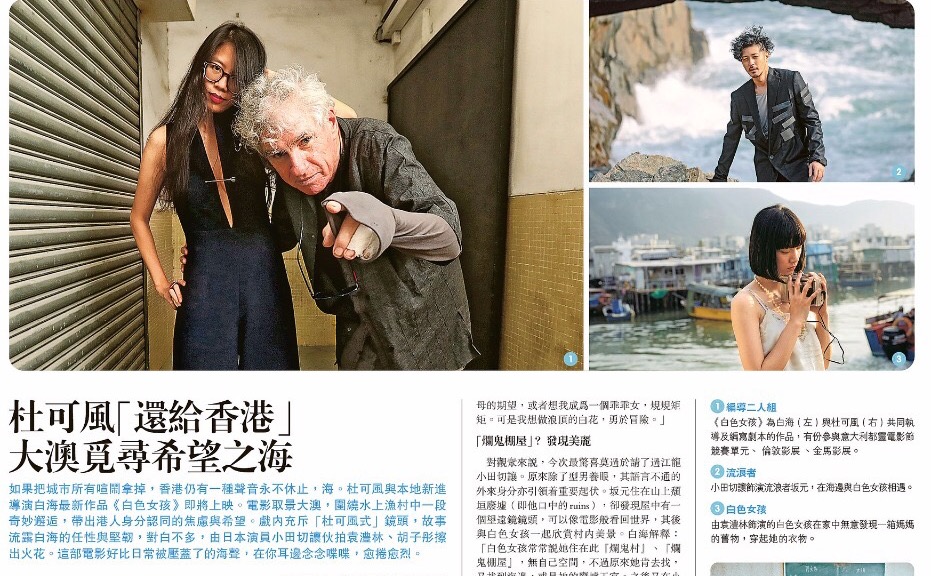Press





















她們都是香港影壇新鮮人。新晉導演白海,苦候七年終於排除萬難,一圓電影夢;文青女神袁澧林Angela,出道短短兩年,既躍身為廣告小天后,新台重點培育花旦,甚至是電影第一女主角。縱使兩人性格不同際遇迵異,卻同樣傾出百分百熱情,以無比堅持、無限誠意成就新鮮片種,為「港產片小陽春」注入能量,迎來「香港製造」電影的新世代。
“The White Girl,” Jenny Suen and Chris Doyle’s co-directed drama, is a work of love. Of struggle. And of hope. After a busy festival run, it has its Singapore premiere Tuesday in the SGIFF."
如果把城市所有喧鬧拿掉,香港仍有一種聲音永不休止,海。杜可風與本地新晉導演白海最新作品即將上映。電影取景大澳,圍繞水上漁村一段奇妙邂逅,帶出香港人身分認同的焦慮與希望。戲裏充滿「杜可風式」鏡頭,故事流露白海的任性與堅韌,對白不多,由日本小田切讓伙拍袁澧林,胡子彤擦出火花。這部電影好比日常被壓蓋了的海聲,在你耳朵邊唸唸喋喋,愈捲愈烈。
我總會覺得「條條大路通羅馬」這句話太廉價,有些事情,只能有一個解決方法;有些時候接受其他方法,只是種退讓與妥協;有些彼岸,只能透過拍攝一部香港電影來解決。「如果主演不是香港人,拍香港電影的意義便衣警不再存在。」新進導演白海鏗鏘說道。她與攝影大師杜可風聯合導演的電影《白色女孩》,說得是香港最後一條漁村中發生的愛情故事--你可以說,裡面講的是一條橋的故事--你甚至也可以說,這電影本身也是一道橋:二人通往夢想彼岸的漫長路途中的其中一道橋。
「青黃不接」,是香港電影人近年最常提及的詞彙。
90 年代香港經濟進入低谷,影壇由輝煌轉向衰頹,許多資深導演和演藝人有見更緊密經貿關係安排(CEPA,2003 年)簽訂, 於是北上發展尋資源、找出路。起初原意是好,業內曾短暫展現生氣,可是當大量本地人材流走、培訓制度和系統欠完善,加 上內地影圈、全球影業競爭愈見激烈,有利因素逐漸消失殆盡。2000 年後,社會矛盾加劇(如沙士疫潮、國民教育和傘運等衝 擊),科技和文化轉型,積弱已久的香港電影在投資、經營和創作上困難叢生,尤如一個人誤墮大海,不知何去何從,還有點窒息。
Armed with a dreamy story and jaw-dropping cinematography that work well to drive home the fading beauty of historical sites, the film brings out the inherent, almost physically painful loss in admitting the inevitable future towards gentrification, even as we fight to save these sites. Deeply metaphorical and worth a second watch, The White Girl is a very accomplished first feature from Suen, and heralds the coming of a new director with the knowhow and potential to add truly unique offerings to Hong Kong’s film canon.
Chatting with Doyle and Suen is like talking to two old friends who know each other so well that they readily accept each other's flaws and embrace each other's talents. While Suen gives off a more serious filmmaker vibe, Doyle is clearly the joker, interjecting the conversation with side stories while Suen patiently waits for him to finish before continuing. But one thing's for sure, both are passionate filmmakers whom we can't wait to see more of in the future.
Read more...
“Hong Kong Trilogy” is a movie about generational differences, and was made by filmmakers from two very different eras.
Mr. Doyle is a veteran of the Hong Kong Second Wave from the 1970s to ’90s, when the city was considered a creative, independent voice in world cinema. But Ms. Suen and Mr. Hui, 31 and 32 respectively, started working long after Hong Kong’s 1997 handover to Beijing — at a time when mainland China was becoming politically, economically and culturally dominant.
The English subtitles at the end of Christopher Doyle’s Hong Kong Trilogy tell us that the people we’ve just met are real Hong Kong people “sharing their DREAMS” before signing off, “Thanks for taking the time to LISTEN UP.” Wouldn’t it be nice if more films were so charmingly gracious? Doyle’s trilogy certainly has charm, which to a degree makes up for a sometimes frustrating sketchiness in terms of substance. The film—three linked semi-documentary vignettes about a location close to the director’s heart—feels as much a community project as a personal statement. It isn’t so much an example of the genre known as the “city symphony”—it’s more like a city jam.
Read more...
When talking about Hong Kong Trilogy: Preschooled Preoccupied Preposterous, the biggest challenge is what vocabulary to use. The film, a hybrid of fiction and documentary, doesn't use a traditional narrative, but it's not entirely abstract either – it's a contemplative sort of parallel storytelling, one where the elliptical space between fact and fiction combines to make a third creature that is no less true.
「這是香港人拍給香港人的電影,不是我拍的電影。」杜可風道。
電影最初名字除了《香港三部曲》五個字外,還有一個副題:「我們是這樣子長大的」。
對杜可風來說,拍這部電影,是對香港這個家的負責任。他自言自己沒有資格、也不打算代表戲中任何一個角色說話,所以他總是利用 VO,讓他們訴說自己的真實故事,讓他們講自己對香港、對人生的想望。
年輕人的勇氣讓杜可風自省,「自己拍了這麼多年戲,好像不曾為下一代做過什麼。」雖 然他早在 2013 年已扶助新導演劉韻文拍攝《過界》,去年也在香港國際電影節拍攝青少 年題材的《香港 2014 —— 仝人教育》,但依然感到不足,「如果我關心這個城市,理應將 創作能力發揮到盡,用錄像接觸更多新事理,求問新生代怎樣看待生活,香港人怎樣看待 香港。」故此六十有二的他決心在 2015 年再出發,與兩位青年創作人許志堅(Ken)及 孫明莉(JennY)合力,透過未為香港商業及獨立影圈廣泛使用的國際非營利募資網站 KICKsTarTer,籌募約10萬元開拍包含老中青及佔領元素的《香港三部曲》,盡人事回應 社會現況之餘,也提醒電影工作者們 : 身處時代轉捩點,應該用影像藝術追求更遠大的夢。
「我們的電影不是一套政治電影,不是,它是一套人的電影,是人。」杜可風說得揮灑直白。Jenny解釋,在創作過程的核心是人,人的故事、對世界的想望,散碎回憶,盤根錯節的情感。在無數的相遇交談中,把這些那些一絲絲地從生活世界中擷取,糅合到電影的光暈之中,「好像是一個bottom-up的故事發展」。
Like Hong Kong itself, "Trilogy" is hard to categorize. At its world premiere at the Toronto International Film Festival in September, it was in the features category; at South Korea's Busan International Film Festival last month, it's being called a documentary.
Doyle isn't keen to choose a side. "Even we're not sure what to call it. All we can say is that it's personal, poetic and political," he said.